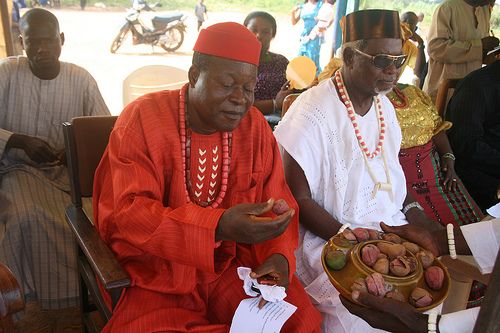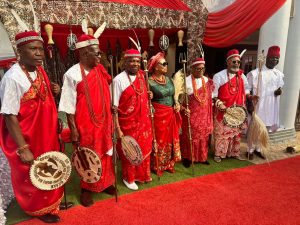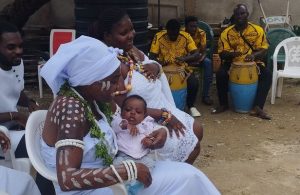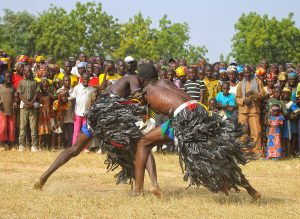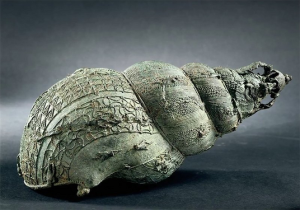For the Igbo people of southeast Nigeria, the Kolanut Ceremony is a major traditional event representing hospitality, solidarity, respect, and spirituality. Deeply ingrained in Igbo cosmology and social life, this ancient ritual embodies the ideals and ideas that have led the Igbo for millennia. The ritual consists of presenting, cracking, and distributing the kolanut, a holy nut with great importance in Igbo tradition. This thorough piece explores the Kolanut Ceremony’s history, meaning, customs, and modern relevance.
Historical Origins and Symbolism
For millennia, the kolanut—known as oji in the Igbo language—has been a vital component of Igbo life. The Igbo people’s history and mythology entwine its beginnings as a cultural emblem with Igbo oral history holds that the kolanut was a gift from the gods given to the Igbo to promote community harmony, peace, and peace. With its distinctive look and many lobes, the nut is seen as a symbol of the varied but cohesive character of the Igbo people.
The kolanut is considered in Igbo cosmology to have mystical importance. It is related with the ancestors and gods as it provides a channel for the Igbo people to interact with the spiritual domain. Considered holy activities, the presenting and breaking of the kolanut call for the presence and blessings of the ancestors and gods. Because its tree, Cola acuminata, is renowned for its endurance and capacity to flourish in a variety of surroundings, the kolanut also represents life and fertility.

The Kolanut Ceremony: Rituals and Practices
Observed on important events like weddings, funerals, celebrations, and community meetings, the Kolanut Ceremony is a highly ritualized rite. The ritual is organized and every action has cultural value and symbolic importance.
The kolanut gift to the assembly starts the event. Usually the host or the oldest guy present addresses the assembly while respectfully handling the kolanut. Presenting the kolanut shows respect and hospitality, therefore indicating the friendliness of the host and the aim for a harmonic meeting. Since everyone here is seen as equal in the perspective of the ancestors and gods, this action goes beyond socioeconomic level.
Finding the individual who would shatter the kolanut comes next after it is on show. In Igbo society, cracking the kolanut is a great duty usually assigned to the oldest man in the gathering or someone with great social or spiritual status. The chosen individual ought to be absolutely moral as breaking the kolanut is seen to be a means of contacting the spiritual world. Care and respect are used throughout the choosing process to guarantee the selected person is deserving of the regard.
The individual chosen to do the work prays and invokes before the kolanut breaks. Seeking their blessings, protection, and direction, these prayers are aimed to the gods, ancestors, and land spirits. Usually recited in Igbo, the prayers capture the communal values and beliefs. Along with thanks to the ancestors and gods for their ongoing presence and assistance, the invocations often call for peace, prosperity, and unification.
Usually accomplished with a little knife or by hand, cracking the kolanut is a delicate operation. Given that every lobe in the kolanut has different connotations, the count of lobes inside the instrument of interest is very important. Considered the most fortunate kolanut with four lobes represents life, wealth, serenity, and fertility. The gathering closely notes and interprets the number of lobes as it is thought to be a communication from the spiritual domain.
Once the kolanut breaks, folks here share it. Sharing the kolanut is a kind of community connection that strengthens togetherness and camaraderie. Recognizing the spiritual and cultural significance of the act, each individual who gets a portion of the kolanut does it with thanksfulness and respect. Usually shared in a clockwise sequence, the kolanut begins with the oldest or most senior member of the group.
Cultural and Social Significance
An arresting emblem of Igbo identity and cultural continuity is the Kolanut Ceremony. Passed down over the years, this custom reminds us of the ideals and values defining the Igbo way of life. The event emphasizes the need of respect for the spiritual world, community solidarity, and regard of seniors.
Apart from its spiritual and cultural value, the Kolanut Ceremony is also important for social interactions. Often used to arbitrate conflicts and promote reconciliation, the kolanut’s presentation and sharing are acts of diplomacy and conflict settlement. Breaking the kolanut is a means of sealing agreements, marking significant choices, and thereby strengthening ties between people and organizations in Igbo culture.
The Kolanut Ceremony also offers younger generations a chance to learn about their background and customs, therefore promoting cultural education. Younger attendees are typically guided in understanding the customs and rituals connected with the event thereby preserving the knowledge and values of the Igbo people for next generations.
:max_bytes(150000):strip_icc()/EmmaMcdonaldWeddingsCourtesyofFeyisolaOgunfemi3-6cef0d12d4694196812471360ca53439.jpg)
Contemporary Relevance
The Kolanut Ceremony is still a colorful and honored custom in modern Igbo culture. The ritual is still carried out in rural and urban environments despite the effects of globalization and modernism. It is evidence of the resiliency of Igbo society and the continuing relevance of the principles it reflects.
The discipline has, nonetheless, also developed to fit shifting societal dynamics. Sometimes the ceremony has been streamlined or changed to suit contemporary living. In metropolitan settings where time and space could be constrained, for instance, the ritual can be shortened but the fundamental components of presenting, prayer, and sharing remain. Reflecting the flexibility of the custom, the use of contemporary instruments and conveniences—such as knives or trays—has also been included into the practice.
Notwithstanding these developments, the core of the Kolanut Ceremony is the same. Bridging the past and the present, it remains a potent emblem of togetherness, respect, and spirituality, therefore strengthening the bond between them. Beyond Igbo society, the ritual is also more acknowledged as it is often part of national and international events involving Igbo people, therefore highlighting the richness of Igbo customs to a larger audience.
Conclusion
A pillar of Igbo society, the Kolanut Ceremony reflects the customs, values, and ideas that characterize the way of life of the people. By means of its rites and symbols, the event underlines in Igbo community the value of hospitality, togetherness, respect, and spiritual connectedness. Considered a cultural activity, it has endured throughout time and changed with the times to keep its central relevance. The Kolanut Ceremony is a live statement of Igbo identity as well as evidence of the ongoing vitality of Igbo civilization, not just a custom.
Please read all our stories on African Culture here
